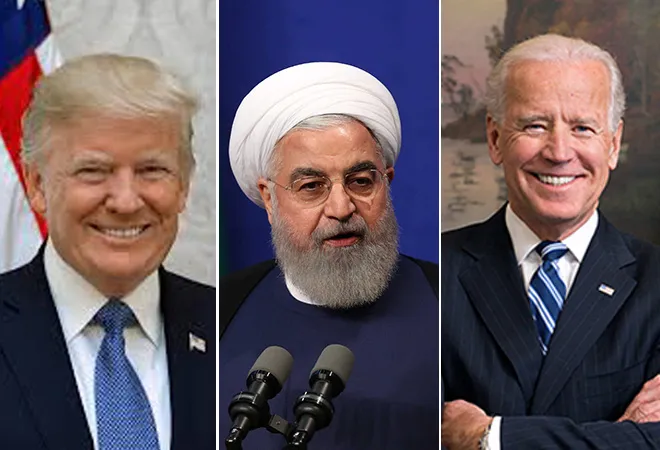
When the leader of the free world singles out one particular country for notably warm and detailed praise twice within the same week, it is no coincidence. Rather, it is a strategically significant development which deserves attention from policymakers and other observers in the international community.
As America’s ties with global superpowers experience an inordinate amount of tension, US President Donald Trump lent telling insights into Washington’s plan for proactively strengthening its strategic and economic alliances elsewhere through his two
recent letters to Ilham Aliyev, President of the Eurasian nation of Azerbaijan.
As America’s ties with global superpowers experience an inordinate amount of tension, US President Donald Trump lent telling insights into Washington’s plan for proactively strengthening its strategic and economic alliances elsewhere through his two recent letters to Ilham Aliyev, President of the Eurasian nation of Azerbaijan.
The
letters – sent during the same week in late May – come against the backdrop of evolving and often-tumultuous times for American foreign policy.
Amid the continued aftermath of disagreements over Syria and Ukraine as well as the alleged Russian interference in the 2016 presidential election, President Vladimir Putin
recently said US-Russia relations are
“getting worse and worse,” while Russian Deputy Foreign Minister Sergei Ryabkov warned that those ties are
at their most dangerous point in years.
Moving eastward, despite the
truce which the US and China had reached at the G20 summit last weekend, Chinese imports as a share of total imports to America were
down by more than 2 percentage points in the first four months of 2019 amid Trump’s trade war with Beijing.
Restoring order to US ties with China and Russia – the world’s
2nd- and 12th-largest economies by projected GDP, respectively – should certainly be a top priority for the Trump administration. Yet, as the state of relations with Moscow and Beijing continues to fluctuate, the White House appears to have identified at least one important component of its plan to broaden America’s global alliances.
“Azerbaijan is more prosperous and connected to the global economy than at any time in its history,” Trump
wrote to Azerbaijan’s Aliyev for the 26th anniversary of the Caspian Oil and Gas Show. “Oil and gas production from Azerbaijan continues to increase stability in world energy markets, including through the Southern Gas Corridor. Azerbaijan can play an even greater leadership role by partnering with other potential suppliers, such as Turkmenistan and countries in the Eastern Mediterranean. Now is the time to expand on your country’s success.”
He added, “The United States supports your efforts to advance economic reforms that will attract foreign investment and spur innovation. The economic success of Azerbaijan will help bring stability to the entire region.”
In his other
late-May letter to Aliyev, on the occasion of Azerbaijan’s Republic Day, Trump reemphasised his appreciation for “Azerbaijan’s contributions to international security and your leadership in enhancing European energy security through the pioneering Southern Gas Corridor.” He also lauded the “strong
partnership built on the foundation of a number of shared interests” and acknowledged Aliyev’s “personal engagement in the OSCE Minsk Group process to find a peaceful and lasting settlement of the Nagorno-Karabakh conflict,” referring to the territorial conflict between Azerbaijan and Armenia.
Trump’s repeated affirmation of American support for the Southern Gas Corridor (SGC) illustrates his administration’s nuanced understanding of Azerbaijan’s status as “the cornerstone of the North-South and East-West transport corridors” as well as a unique “bridge between the Asian and European continents,” as Aliyev has described his country. In other words, Azerbaijan is precisely the piece you want to own in a real-life version of the strategy board game Risk.
Trump’s repeated affirmation of American support for the Southern Gas Corridor (SGC) illustrates his administration’s nuanced understanding of Azerbaijan’s status as “the cornerstone of the North-South and East-West transport corridors” as well as a unique “bridge between the Asian and European continents,” as Aliyev has described his country.
Inaugurated about a year ago, the Azerbaijan-led SGC project bypasses Russia and therefore promises to substantially decrease Western dependence on Russian gas. This $41.5 billion initiative will nearly 2,200 miles across seven countries and will involve over a dozen major energy companies. Its three linked pipelines will deliver gas from Azerbaijan’s Shah Deniz 2 field, positioning Baku as the leading player in redrawing Europe’s energy map.
According to US Assistant Secretary of State for Energy Resources Frank Fannon, Moscow is “fearful” that the US will disrupt Russia’s energy monopoly in Europe not only by vying to export American gas to that continent, but also through Washington’s backing of the SGC.
At the same time, the strategic importance of the SGC – and energy ties with Azerbaijan more broadly– is arguably greater than ever for the US amid experts’ forecasts of instability in oil prices resulting from the escalating American tensions with Iran. Moreover, Azerbaijan is the only country which shares borders with both Iran and Russia.
Trump’s recent letters are unmistakable signs of his administration’s growing embrace of Azerbaijan as a centerpiece of its strategy from Europe to Asia to everywhere in between. A deeper relationship with Azerbaijan is hardly the only piece of America’s strategic puzzle during this time of shifting geopolitical dynamics. But in Baku, Washington certainly possesses a crucial building block.
The views expressed above belong to the author(s). ORF research and analyses now available on Telegram! Click here to access our curated content — blogs, longforms and interviews.
 When the leader of the free world singles out one particular country for notably warm and detailed praise twice within the same week, it is no coincidence. Rather, it is a strategically significant development which deserves attention from policymakers and other observers in the international community.
As America’s ties with global superpowers experience an inordinate amount of tension, US President Donald Trump lent telling insights into Washington’s plan for proactively strengthening its strategic and economic alliances elsewhere through his two recent letters to Ilham Aliyev, President of the Eurasian nation of Azerbaijan.
When the leader of the free world singles out one particular country for notably warm and detailed praise twice within the same week, it is no coincidence. Rather, it is a strategically significant development which deserves attention from policymakers and other observers in the international community.
As America’s ties with global superpowers experience an inordinate amount of tension, US President Donald Trump lent telling insights into Washington’s plan for proactively strengthening its strategic and economic alliances elsewhere through his two recent letters to Ilham Aliyev, President of the Eurasian nation of Azerbaijan.
